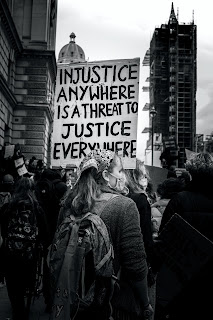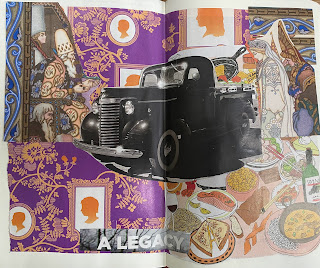Day 86 – Critical Race Theory and 1970s
Day 86 – Been thinking about the 1970s today – yes, it is in many
ways my era. I came of age in the 1970s,
graduated from high school in 1977, and became an adult – born in 1959, I’m
right at the end of the Baby Boomer era.
Growing up in San Francisco in the 1970s, I experienced a particular
side of the 1970s – the post-60s Flower Power era of sex, drugs, and
rock-n-roll meets Motown and Soul Train; the election of Harvey milk and the
growth of the Castro.
Photo by Jamie Street on Unsplash
I’ve been thinking about the 1970s because the program at Lesley University began in the 1970s. Reading Kossak’s (2009) chapter, The Birth of a New Profession: Lesley’s Expressive Therapies program 1973-present, again I’m struck by how the Humanistic psychology movement and the Open Education movements (which in part gave rise to the Lesley program) seemed radical at the time, but looking back was still upholding many systems of privilege.
While the era was certainly a demonstration of the growth of the culture – when we look back we understand that there continues to be an entrenchment of racism. The rise in recent years in White Supremacy; and the increasing assault on women’s rights; and the gap between those who have and those who don’t; makes it easy to understand both the need for Critical Race Theory in the 1970s and now.
I found a great article by Janel Green (2021) in the Human Rights Magazine (Vol. 46, No. 2: Civil Rights Reimagining Policing) entitled, A Lesson on Critical Race Theory. In it Green writes:
CRT is not a diversity and inclusion “training” but a practice of interrogating the role of race and racism in society that emerged in the legal academy and spread to other fields of scholarship. Crenshaw—who coined the term “CRT”—notes that CRT is not a noun, but a verb. It cannot be confined to a static and narrow definition but is considered to be an evolving and malleable practice. It critiques how the social construction of race and institutionalized racism perpetuate a racial caste system that relegates people of color to the bottom tiers. CRT also recognizes that race intersects with other identities, including sexuality, gender identity, and others. CRT recognizes that racism is not a bygone relic of the past. Instead, it acknowledges that the legacy of slavery, segregation, and the imposition of second-class citizenship on Black Americans and other people of color continue to permeate the social fabric of this nation.



Comments